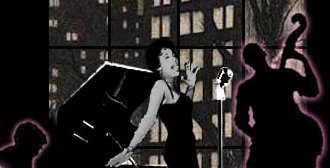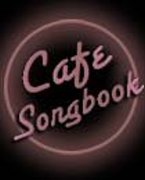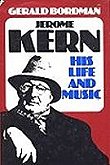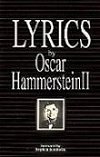Welcome toCafe SongbookInternet Home of the |
 |
 |
| Home || Songs || Songwriters || Performers || Articles and Blogs || Glossary || About Cafe Songbook || Contact/Submit Comment | |
| Search Tips: 1) Click "Find on This Page" button to activate page search box. 2) When searching for a name (e.g. a songwriter), enter last name only. 3) When searching for a song title on the catalog page, omit an initial "The" or "A". 4) more search tips. | |
All the Things You Are |
|||
| To search this page only, use your browser's "Find" command: keystroke: Control + F (Windows) or Command + F (Mac). (search tips) | |||
Written: 1939 |
Music by: Jerome Kern |
Words by: Oscar Hammerstein II |
Written for: Very Warm for May |
| Page Menu | |||
| Main Stage || Record/Video Cabinet || Reading Room || Posted Comments || Credits | |||
On the Main Stage at Cafe Songbook |
|
Ella Fitzgeraldperforming "All the Things You Are"from her album Sings the Jerome Kern Songbook |
|
Stan Getz (trumpet), Dizzy Gillespie (tenor sax) , Arnie Lawrence, alto sax, performing "All the Things You Are" (at the Nice Jazz Festival, 1979)
|
|
|
(Please complete or pause one video before starting another.) |
More Performances of "All the Things You Are" in the Cafe Songbook Record/Video Cabinet (Video credit) |
Cafe Songbook Reading Room"All the Things You Are" |
|||||
|
"All the Things You Are" was written for Very Warm for May, a Broadway musical, with book and lyrics by Oscar Hammerstein II and music by Jerome Kern. The show opened Nov. 17, 1939 and closed Jan. 6, 1940. This was Kern's last Broadway show. For Alec Wilder in his classic book American Popular Song, Very Warm for May "was a complete failure; the reviews were so bad that only twenty people were in the audience the second night . . . . The book must have been terribly bad, since otherwise the show's failure is incomprehensible. For it had one of Kern's best scores. Indeed, there are five songs well worth considering, the greatest of them being "All the Things You Are." (p. 77). Wilder's other worthies are "Heaven in my Arms," "In the Heart of the Dark," "In Other Words, Seventeen," and "All in Fun." The song was "Introduced on Broadway in Very Warm for May by a quartet (Hiram Sherman, Frances Mercer, Hollace Shaw, and Ralph Stuart) . Two singers sing as the characters themselves and two singers represent their hearts. Over the years, the song has been sung almost exclusively as a solo and the show lyrics, which have a verse constructed for the quartet, is replaced in the sheet music lyrics by the verse so familiar to subsequent listeners, beginning "Time and again I've longed for adventure / Something to make my heart beat the faster." To see the complete versions of both verses consult Amy Asch (Ed.), The Complete Lyrics of Oscar Hammerstein II, (p. 244). |
||||
|
Use in Productions Other Than the Original Movies: Broadway Rhythm, 1944, (loosely based on Very Warm for May, song performed by Ginny Simms). A Letter for Evie, 1946, (song performed as a theme throughout movie). Till the Clouds Roll By, 1946, Biopic of Jerome Kern (song performed by Tony Martin). The Seven Hills of Rome, 1958, (excerpt performed by Mario Lanza). Mrs. Henderson Presents, 2005, (song performed by |
||||
|
Early Recordings That Made the Charts Tommy Dorsey, 1940 (1); Artie Shaw, 1940 (8); Frankie Masters, 1940 (14). (Source: Joel Whitburn, Pop Memories) |
||||
| Critics Corner | |||||
 Thomas Hischak, The Tin Pan Alley Song Encyclopedia |
Thomas Hischak writes about "All the Things You Are":
|
||||
 Alec Wilder, American Popular Song The Great Innovators, 1900-1950, New York: Oxford University Press, 1972. |
Alec Wilder relates the story that "Kern was convinced that a song so complex [as "All the Things You Are] could never be a hit, but that a moment after voicing this fear to a friend he heard a passing pedestrian whistling it." Wilder goes on to note, "Well, it's not a simple song. It starts simply enough, to be sure, but it soon becomes tricky." After explicating the tricky parts in some technical detail, Wilder comments, "And yet for all that, I've never known a layman enthusiast of the song to boggle at this point and fail to continue singing or whistling it. It's not only very ingenious, but very daring. I am as surprised as Kern is alleged to have been that it became a hit. Perhaps one should hark back to that old theory that if the opening measures of a song are singable, it doesn't matter how complex the rest of it is" (Alec Wilder, American Popular Song The Great Innovators, pp. 78-79, hardcover edition). |
||||
 Allen Forte, The American Popular Ballad of the Golden Era, 1924-1950, Princeton, Princeton Univ. Press, 1995. |
At the outset of a seven page discussion of the complexities of Kern's music for "All the Things You Are," Allen Forte notes,
|
||||
| Wikipedia |
The Wikipedia entry for "All the Things You Are" includes commentary on the song's harmonic form as well as a discography. | ||||
 Wilfred Sheed, The House That George Built: With a Little Help from Irving, Cole, and a Crew of About Fifty |
Wilfred Sheed is also interested in the difficult aspects of Kern's song in relation to how singable it remains. He notes that "'All the Things You Are' was almost too good and is so musically sophisticated that Kern almost yanked it from the show [Very Warm for May] because the public wouldn't get it. And speaking strictly as a failed pianist and lifelong beginner . . . I can testify that it's sheet music is the most formidable I've seen so far, outside of Gershwin's own arrangements. Listening to it, I can only marvel at how it gets from here to there" (p. 139). In comparing Duke Ellington's "Prelude to a Kiss" to Kern's "All the Things You Are," Sheed writes, "I would instantly vote ["Prelude to a Kiss"] the most beautiful song ever written, except for this one problem of the words. By contrast "All the Things You Are," its nearest rival, is a singer's song in the most fundamental sense, you want to start singing it immediately. And although it's a great piece of music in its own right, I've never heard a purely instrumental version of it" (Wilfred Sheed, The House That George Built, p. 110, hardcover edition). [Editor's note: At another place in his book (p. 140), Sheed ups the estimation of this song just a bit by calling "All the Things You Are" "this greatest of American Songs." And not only are there more than just a few instrumental versions, the song has become, as Forte notes, a jazz staple. (See the Cafe Songbook Record/Video Cabinet for a few examples: Modern Jazz Quartet; Duke Ellington; Oscar Peterson; |
||||
 Gerald Bordman, Jerome Kern His Life and Music, New York: Oxford University Press (1980) |
"On September 24, [1940] Jerry gave the lie to his own laments that he could no longer play well when he appeared at a special program at the San Francisco World's Fair. The program, arranged by ASCAP, gave visitors a unique chance to see and hear most of America's greatest composers play their own beloved melodies. Irving Berlin, George M. Cohan, and a host of other celebrities entertained admirers. Kern played two compositions, "All the Things You Are: and "Smoke Gets in Your Eyes." As Recordings of the event disclose, Kern played them in a slightly florid style marked by some unexpected tempos, a style Saul Chaplin has labeled the 'Viennese Concert Style'" (Gerald Bordman, Jerome Kern His Life and Music p. 387).
|
||||
 Oscar Hammerstein II, Lyrics, New York: Simon and Schuster, 1949. |
While writing "All the Things You Are," Oscar Hammerstein found himself in a lyricist's dilemma. He relates:
|
||||
 Hugh Fordin, Getting to Know Him, Da Capo Press, 1995 (orig. publ. 1986). |
For several reasons, the winter of 1939-1940 was a difficult time for Oscar Hammerstein. The early closing of Very Warm for May did not help matters. A bright spot was the emergence of "All the Things You Are" as a hit. This was signaled to the lyricist by a report from his daughter Alice, a student at the University of Chicago, that the song "began to be played with increasing frequency on the radio . . . that sometimes it was as often as three times in half an hour—her friends knocked on her door each time to inform her that it was on . . . [and it] became the number one song on the Hit Parade for many weeks. The song boosted not only Oscar's ego but his ASCAP income, which now averaged about $25,000 per year" (Fordin, Getting to Know Him pp. 171-72).
|
||||
 Will Friedwald, Sinatra! The Song Is You A Singer's Art, New York: Scribners, 1995. |
As for "All the Things You Are" eventually becoming a standard despite Hammerstein's use of "Divine," not to mention the failure of Very Warm for May, Will Friedwald, in his book bearing as its title, the title of another Kern song, "The Song is You," credits Frank Sinatra: "It's true that no one introduced more standards than Fred Astaire, who had all the major Broadway legends almost simultaneously penning film scores for him. But no performer turned more songs into standards than Sinatra." One of Friedwald's examples is "All the Things You Are" (p. 157, Friedwald, Sinatra! The Song Is You A Singer's Art, hardcover ed.).
|
||||
|
Referring to Hammerstein's dislike of his word "Divine" (See above.), Philip Furia and Michael Lasser find the word quite satisfactory. They write:
Furthermore, it apparently didn't bother a lot of other professional songwriters either. Furia and Lasser report that "in a 1964 pole in Saturday Review, more composers called it ["All the Things You Are"] their favorite song than any other" (Furia and Lasser, America's Songs p. 157). |
||||
 Philip Furia, The Poets of Tin Pan Alley: A History of America's Great Lyricists, New York: Oxford University Press, 1990. |
Philip Furia, although an admirer of Hammerstein's talent for composing singable lyrics (like Sheed—see above) also saw, as did many others, a distinction between him and the lyricists of The Songbook like Hart, Gershwin and Porter who "flashed brilliant imagery and reveled in clever rhyme." Furia elaborates:
|
||||
 Max Wilk, They're Playing Our Song: Conversations with America's Classic Songwriters (originally published 1973 as They're Playing Our Song: From Jerome Kern to Stephen Sondheim—The Stories behind the Words and Music of Two Generations), New York and Stratford, CT: Easton Studio Press, 2008. |
As much admiration as Kern's collaborators had for him, there was no shortage of observations about his capacity to be difficult, especially when it came to how his music was performed. The orchestrator whom Kern preferred to any other was Robert Russell Bennett, He was one of those who had experienced some of the composer's less appealing qualities. Nevertheless, Bennett related the following to Max Wilk:
|
||||
|
All the Things You Are as Jazz Standard Ted Gioia begins his article on "All the Things You Are" by damning it with faint praise. After acknowledging that he thought of calling the song his favorite jazz standard, he also says he is not especially entertained by the song as written by Jerome Kern. He finds it too "predictable" and "austere." It is rather that the song as written is a "springboard for jazz improvisation" that excites him. "I love this song less for what it is, than for what it can be" (Gioia's italics). He goes on to note how many jazz artists have returned to the song over and over during their careers. The irony here that Gioia wants us to appreciate is that Kern himself was hostile to musicians who took liberties with his work through improvisation as well as being hostile to jazz in general. Nevertheless the jazz players were not put off and wound up giving the song a second life that it most likely would never have achieved without them. Gioia does acknowledge, however, the song's influence outside of jazz by noting that a nine year old Stephen Sondheim managed to see the short-lived Broadway show Very Warm for May for which "All the Things You Are" was written, later crediting the song as influencing his choice to become a Broadway songwriter. He also admits that Kern's work was resilient enough to weather "the passing fads and styles of the jazz world with admirable endurance and adaptability." Gioia cites and comments on several of the versions of "All the Things You Are" listed in Cafe Songbook Record/Video Cabinet (this page) as well as other jazz interpretations including:
Other recordings of "All the Things You Are" mentioned by Gioia include those by Johnny Griffin
|
||||
Serge Gainsbourg (piano), Elek Bacsik (guitar) Michel Gaudry (bass) -- A prototypical mid-twentieth century Paris jazz boîte, with the Gainsbourg trio playing "All the Things You Are." (1964) |
|||||
| Lyrics Lounge | |||||
To read a version of the lyrics for
The complete, authoritative lyrics for "All the Things You Are" can be found in
Click here to read Cafe Songbook lyrics policy. |
|||||
| back to top of page | |||||
Visitor CommentsSubmit comments on songs, songwriters, performers, etc.
Feel free to suggest an addition or correction. Please read our Comments Guidelines before making a submission. (Posting of comments is subject to the guidelines. Not all comments will be posted.) |
| To submit a comment, click here. |
Posted Comments on "All the Things You Are": 02/19/2015 from Uncle Wags: I am researching all that I can digest regarding the hauntingly beautiful "All The Things You Are" because I plan to sing it to the "Dearest thing I know" on our 60th wedding anniversary in July of 2015. I became fond of its' sentimental lyrics and its harmony when I first heard them as a 15 year old boy in the 1940s. While I am absolutely NOT a singer, I am beginning to vocally practice this song immediately at this very moment. My daughter who is a voice coach will teach me how to sing this lovely piece. At age 85, my time is passing by, but I wish to sing this to my life partner at our forthcoming 60th anniversary party in the presence of 100 intimate friends and family members on a hotel ballroom floor. |
| back to top of page |
Credits(this page) |
Credits for individual YouTube Videomakers of custom videos used on this page:
Borrowed material (text): The sources of all quoted and paraphrased text are cited. Such content is used under the rules of fair use to further the educational objectives of CafeSongbook.com. CafeSongbook.com makes no claims to rights of any kind in this content or the sources from which it comes.
Borrowed material (images): Images of CD, DVD, book and similar product covers are used courtesy of either Amazon.com
Any other images that appear on CafeSongbook.com pages are either in the public domain or appear through the specific permission of their owners. Such permission will be acknowledged in this space on the page where the image is used.
For further information on Cafe Songbook policies with regard to the above matters, see our "About Cafe Songbook" page (link at top and bottom of every page). |
The Cafe Songbook |
||
|
Performer/Recording Index
(*indicates accompanying music-video)
|
||
1939
Notes: "If you are a fan, new or old of Swing music, and you want a good sampling of some of the swing kings, these "Essential" ones by Columbia Legacy and Bluebird are the way to go. They have the best sound, they fit a lot of music on the discs, and aren't very expensive. If the guy you're looking for is not available, try the 'Bluebird's Best' series. They are mastered by the same people, and sound great as well. (from Amazon customer reviewer Comic Online) |
||
1945
|
||
1948
notes: Video below from album: Live at the It Club: Complete | ||
1952 notes: John Lewis, piano; Milt Jackson, vibes; Percy Heath, bass; Kenny Clarke, drums
(Please complete or pause one | ||
1957
Video: Recording on video is from Ellington album Indigos | ||
1957
notes: "The considerable achievement of Carmen McRae was always somewhat eclipsed by the dazzling technique of Ella Fitzgerald and Sarah Vaughan, not to mention Billie Holiday's personal drama or the flamboyant romanticism of Dinah Washington. Still, Carmen might have been the smartest, most discerning singer among them, and the one most suited to properly interpret the Great American Songbook, Ella's songbooks notwithstanding. SINGS GREAT AMERICAN SONGWRITERS brings together jazz producer Orrin Keepnew's selections of key performances from McRae's Decca years and lends a useful perspective on a career characterized by fine musical-literary instincts. While Ella sang as if the words to songs sometimes embarrassed her and Sarah as if she didn't know what they meant, McRae's unpretentious way with lyrics almost always revealed something of the song's real meaning. And unlike the cabaret great Mabel Mercer, who certainly knew what a song meant, Carmen had a truly lovely voice, offset sometimes by her somewhat sardonic tone. Still, it is the ballads here, like "Blue Moon" or the magnificent "Every Time We Say Goodbye" among others, that stand as perfect little works of art. This is part of Decca's Legendary Masters Of Jazz series . . . ." (from CD Universe Product Description) |
||
1957
Notes: Keely Smith recorded "All the Things You Are" for her debut Capitol LP, |
||
1958
Notes: "George Martin used to produce the Goon Shows before he became associated with the Beatles, and Peter Sellers was a genius. Somewhere in there they made an exceptionally clever, masterfully done, and truly very funny comedic album" (from Amazon customer reviewer Double Shot Dopio). On the album track, Sellers is apparently singing "All the Things You Are" in the bathtub of his shared rooming house bathroom. As YouTube poster Richard Macintyre notes, it must have been very crowded in there with the orchestra and all. |
||
1960
|
||
1962
notes: "This is the Columbia reissue of the original 2-LP set documenting Bennett's triumphant 1962 Carnegie Hall concert, which was recorded on the heels of "I Left My Heart In San Francisco's" massive success. Bennett has this audience (which includes Frank Sinatra and Perry Como-- an "Italian singing school" as he comments from the stage) in the palm of his hand. . ." (Read he full product description at CD Universe). |
||
1963
Notes: The orchestra is conducted and the arrangment is by Nelson Riddle, recorded in 1963 for the Norman Granz produced LP Ella Fitzgerald Sings the Jerome Kern Songbook. Click here |
||
1967 Notes: Barbra includes the verse. For sheer beauty, it's difficult to find a better version.
(Please complete or pause one |
||
1970
(Please complete or pause one |
||
1989
(Please complete or pause one |
||
2001
|
||
2001
(Please complete or pause one |
||
2005
(Please complete or pause one |
||
| Home || Songs || Songwriters || Performers || Articles and Blogs || Glossary || About Cafe Songbook || Contact/Submit Comment | |
© 2009-2018 by CafeSongbook.com -- All Rights Reserved |





